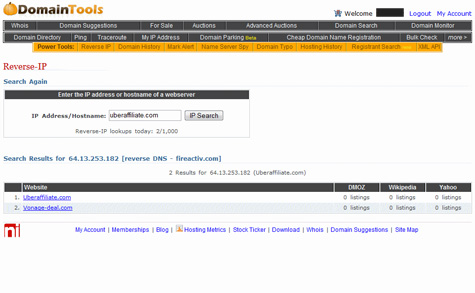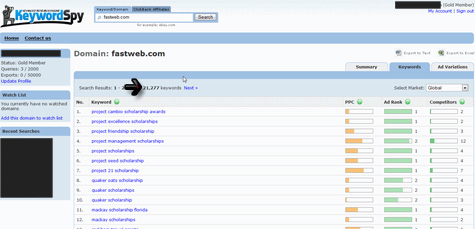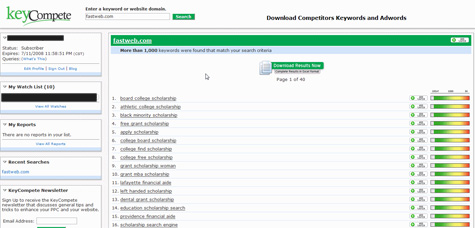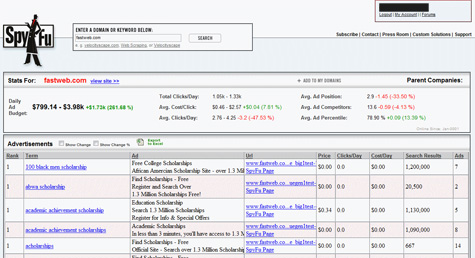The World of Affiliate Espionage

What I’m going to be talking about doesn’t really fit into a “whitehat” or “blackhat” spectrum, but lies in more of a gray area. Affiliate espionage is something that can be very profitable, but also deadly if you’re caught “spying” on the wrong person. I’ll also talk at the end of the article about how to protect yourself from being spied on.
Note/disclaimer : many of you will view these “tactics” as bad business practice. I wouldn’t disagree completely with you there. While I will be talking about these methods, I’m not saying that’s what I do for my campaigns – because it’s not. In all honestly the time I’ve spent looking at domain history and through KeyCompete, has been almost all speculation. If anything, you’ll just see the same recurring trends like I did – ringtones, dating, dvd rentals, ringtones, dating, dvd rentals, etc.
Alright, now let’s go deeper…
What do I mean by “Affiliate Espionage” ?
First off let’s define what I like to call affiliate espionage. Due to public tools and your own personal tracking, it is possible to find a profitable affiliate website, find the keywords that are being bid on, and most importantly finding out what other niches that affiliate is promoting. Let’s start with the beef here. I’m sure many of you know about this tool, but I’m also sure a lot of you probably aren’t aware of it. It’s a public tool called a reverse-IP, and allows you to see all sites that resolve to a certain IP address.
Reverse-IP = Walther PPK
I use the DomainTools tool because that’s just where I look up a lot of domain information, there are other reverse-IP tools out there. Note that this is a paid tool, you can get a preview for free but have to pay for full access. Now using the reverse-IP lookup combined with other tools can allow you to dig pretty deep into a targeted affiliate. Most big affiliates host their sites on a dedicated server, so in looking up 1 domain, you can see the 50 other domains they have hosted on that server. I’m pretty sure a lot of those domains are going to be affiliate landing pages. You can look at the pages, see if they’re advertising them anywhere visible (search engines), and check out what position they’re in and what offer they’re going to. Here’s an example screenshot of what a reverse-IP for UberAffiliate.com looks like (click to enlarge) :
Uh oh, you entered my blog in and saw my affiliate pages! ;)
Let’s take this 007 tactic a little further. Say you have this affiliate who maybe said one of his sites somewhere in a post or to you personally or whatever. Now you know this affiliate is really successful. You reverse IP the site he gave you, and 10 random domains show up that he owns, none are affiliate pages. Now in Domain Tools, there’s also an IP history tool, where you can see all the IP’s a domain has been hosted on. If they’re a really big affiliate, there’s a chance they host sites on multiple dedicated servers, or multiple IPs. You can take the domains you have and plug them into the IP history, and then see all the IP addresses that domain was on. Take those IP’s and plug them into the reverse-IP tool and you may find something nice.
Is this the end-all tool? No, a lot of affiliates have prepared to protect themselves against these types of things, but you’d be surprised at how many don’t.
Landing Page Research
This isn’t really all that bad, but it’s a smart thing to do. It’s really not that hard to find the leaders in a niche, but even if you can’t just by looking through search engines, you can through a reverse-IP and such. Now you know a bunch of landing pages of a big affiliate. Take a look at them, study them. What makes them special? What techniques are they using? Is there a white background? Any animated .gif arrows? Where’s the call to action? Gradients or solid colors? If they’re a big affiliate, they’ve done their research and things are a certain way for a reason. Take note of all of these things when having your page designed. Have it include the same bits and pieces, but also be prepared to test new things. You may think of something that they did not.
I’d review a random landing page here, but I don’t really want to put anybody on the spot and have that affiliate get pissed at me. If anybody wants to submit their own landing pages for review, I’d make a post about it sometime.
Keyword/Ad Spying
Seeing as there’s tools out there called KeywordSpy and KeyCompete – it’s not really a secret that the goal of them is to find what keywords other domains are bidding on. While not completely accurate, you can find some solid keywords that don’t have too much competition on them. If you’re going to use this tool as a means of espionage and not just to gather a ton of keywords, make sure that you actually research the main short tail keywords and make sure that the site you’re peeking at is actually bidding on those keywords. The higher position they are, generally the more they’re paying which means the better it’s converting. If you see that they’re #8 for most of their keywords, but this 1 keyword they’re #1 for, they must really like that keyword. If you just export the KeywordSpy list and upload it into adwords…good luck getting killed.
There’s another tool out there called SpyFu, that is designed to spy on PPC campaigns of websites. You can search a domain, and then view they keywords that the domain is bidding on. Taking it even further, you can see their average position, price they’re paying per click, ad copy, and number of competing ads. While again it’s not 100% accurate, you can get ideas for types of keywords to bid on. Here’s some screen shots of the keyword/ad spying tools (click them to get the full enlarged screen) :
KeywordSpy :
KeyCompete :
SpyFu :
How Do I Prevent Myself From Being Spied On?
After reading this, it may come as sort of a surprise to some of you that you have affiliates doing a reverse-IP on your blog and seeing some of your landing pages and what offers you’re promoting. You can do a few things to help protect yourself, if you don’t want anybody knowing anything about your sites :
1) Keep your yap shut about your domains. If you don’t mention your domains anywhere, people won’t have a domain to look up.
2) Use WHOIS protection information. If you look at the WHOIS information on a lot of sites, it’s all “Domains by Proxy”, which is registering the domain privately through GoDaddy. That way spies can’t grab any personal info and match it to info on other domains.
3) Put your blog or some affiliate pages on a shared host. If someone looks up your IP and sees 2,000 other sites on the IP, they’re not going to know off the bat what sites are yours.
4) If you have a dedicated server, you can get multiple IP addresses and host what sites you want on each address. You can have your blog on 1 IP, your random sites you share on another, and then your private affiliate sites on another. I host at MediaTemple and and every extra IP is $1 a month I think.
You can have the gun, but you have to be James Bond to use it right…
You can easily have access to quite a bit of information. Niches, landing pages, keywords, ad copy…pretty much everything. But another thing I’ve noticed is that even if you have the gun, you have to know how to use it right in order to benefit from it. All the information isn’t concrete, isn’t up to date, and certainly may not be profitable at all. An affiliate may have access to an offer that allows it to profit. If you don’t have their offer or payout, you could suck with it. They may know a couple quality score tricks that maybe you can’t see, or maybe their account history is 50x better than yours. So while they may be paying $0.20 a click for the 3rd position, you may have to pay $0.50 to get there. That makes an enormous difference, and could put you in the red big time. Putting that aside, you do still have access to the weaponry, and in learning how to use it right, you could boost your income.
Am I some immoral, spying bastard?
I talk about these things like I’ve done them before…sure I have, I can admit that. Do I base all of my income on spying on others and “stealing” their work? Nah. I’ll say it time and time again, my belief is that we learn best from others, and leading by example. If you see a successful page with a flashy arrow, is it considered stealing the idea if you put one on your page? I don’t think so, it’s part of the process of learning. Like I posted in the beginning, it’s mostly speculation for me. I’ll find out a site about someone and then I’ll dig everything until I can’t dig anymore. Most of the time I’ll find something out, but won’t do anything about it. Just collected knowledge on what might be working for other people. I just like posting and talking about these things because although I am good in nature, I like to explore and learn about every side of an industry. In affiliate marketing, the majority of what I make comes from what I teach in this blog all the time. Testing and tweaking regular campaigns and niches in Adwords to get them as profitable as possible. Aside from that, I do know a few spamming techniques. I know a blackhat affiliate technique a friend showed me that made him almost $200k in about 3 weeks. It’s very very shady, but smart. Have I used the tactic? Nope. Once I try and get into SEO more, my first site will focus on being white hat, but I sure as hell want to learn as much blackhat as I can. All knowledge is good to know, it gives you more of a feel as to how your industry works.
The world of Affiliate Espionage has been expanding, and will most likely continue to expand. I’m sure there’s more ways to spy on other websites and domains, and those ways will probably be made into a public tool at some point. Maybe one of you can be the next one to design that tool, who knows. I just wanted to discuss some of the things out there that a lot of people know about, but many people don’t know about. I’m sure a lot of you will be moving your blogs to shared hosting soon as well :).
For England, James?






Yeah all this stuff is a must. Then it comes down to a few things. Tracking, Money and and Tweaking.
Typically you’d dump all the keywords you pull from one of the keyword spy tools into your PPC company of choice. Then bid very high on them and see what gets traffic and what converts. Then start trimming… Hence the money part. Costs a lot of cash to find a good new niche especially if you play in the 1-4$/click realm. Because you can’t really judge a keyword until you have got the cost of the word spent. For example if you’re paying 2$/click and the offer pays 20$ I typically will wait for 10-12 clicks before I can the word. So that’s 20-24$/word to test. Times 1000 words is 20-24k dollars ;)
Of course there’s other slower ways to go and ways to trim those costs but you get the basic idea. Hence why a lot of people play in the cheap niches and blackhat :P
“Due to pubic tools”… might want to check the spelling of that 3rd word.
smaxor – that’s why I want to learn more blackhat…play around with things more.
dictonary – yeah my laptop keyboard sucks and skips out on keys a lot and then I don’t catch it. funny though, thanks.
OK! I’ll treat you like a hedge fund. That is, I will give you 20% on the profit. What do you have to lose? Show me this technique. (email me)
…..”I know a blackhat affiliate technique a friend showed me that made him almost $200k in about 3 weeks.”
I’ll take a guess and say he’s referring to flyer ad spamming Facebook. A handful of people were making 50k+ a week by using automated tools to create 100s of accounts (to get around their $50 limit) but they quickly caught on and this is not possible any more.
The one thing I’ll say is that it has nothing to do with Facebook.
Other than that, I’m not saying anything about it.
Cool deal then, hopefully that means people are still doing it. Good for them!
Great information again sup3rnova. :)
I have used most of these tactics before but it’s always good to find more ways to accomplish them.
Thanks,
Jonathan
This is eye-opening stuff. I had no idea people could spy on you this way. I just plugged my own blog domain (where I also host my niche domains) into domain tools and it came up with 853 other domains on it so I guess that’s ok.
Ah, some great tips there and somthing that I’ve never though of before, but come to think of it should have been blindingly obvious.
I guess thats one of the disadvantages for having a dedicated webserver/static ip – unless you know how to stop the espionage!
vonage-deals.com lol… good stuff. :)
This is very interesting. Though, I imagine you have to dig really hard to get to the gold, because all super affiliates are probably aware by now that they can be spied like this.
automated tools to create 100s of accounts
Came across the site today. Pretty interesting ideas. Apart from these sites you mentioned, I think there are a few other desktop based softwares also that do the spying job. Not sure about the accuracy, but always an open option.
interesting write up dude!
Interesting…new perspectives created.
DomainTools is ripoff, it doesn’t work. As somebody who maintains my own dedicated servers and has been using Unix since the 1980’s and Linux since 1993, I might add with Cisco CNE certification, there is no way you can do a reverse lookup and find out what domains are on a particular server. DomainTools uses and “assume and aggregate” system to determine their data and it’s totally inaccurate.
cks
Why pay for a service you can do yourself? Just pull up a command prompt and use nslookup to find the ip of the site your targeting and then crawl the IP block. However, I will again, give you a piece of vital information. I am with PEER1 and I know that PEER1 and also The Planet and Hurricane Electric all assign IP’s on a “per-need” basis to dedicated server customers. I request mine (for my hosting clients) in blocks of four and I am currently routing eight Class “C” blocks *on one dedicated server alone*
If you want a custom tool built just for you that will do the same thing as DomainTools (and avoid the $30 monthly fee), I can offer you your own script that will learn as you research for $100. If you’re intersted, send me a PM at my forum Code4Gold.
In response to your friend making $200k in three weeks, that’s just incredible! I’d pay good money to learn how to do that or even half that!
“As somebody who maintains my own dedicated servers and has been using Unix since the 1980’s and Linux since 1993, I might add with Cisco CNE certification,”
Interesting, Cisco does not offer a CNE cert, Novell does.. Are you posting this simply to impress and sell a crappy script?
“there is no way you can do a reverse lookup and find out what domains are on a particular server.”
Are you sure about that? You may want to think of the information they collect on all of the domains and rethink that statement.
“use nslookup to find the ip of the site your targeting and then crawl the IP block.”
This is not a valid methodology. Have you ever heard of host headers? What is 100 hosts are on that single IP address, nslookup is going to show you the reverse entry given to the host, not the names of all of the websites.
“I request mine (for my hosting clients) in blocks of four and I am currently routing eight Class “C” blocks *on one dedicated server alone*”
Again, sounds like you are not aware of host headers. You must have learned everything you know in the 80’s back on that unix box. You either have over 750 clients in which case you would be too busy to post on here, or your wasting IP space. Wait there is a 3rd option as well, you must be totally full of it.
Keeping in line with you thinking you should stop paying the electric company. If you want to send me $100 , I will send you instructions on how to make your own using nothing but a key, a little string, and a kite!
very informative.
thanks.
Privacy and the Internet are not always the best of friends. You can bet that this information is being used to its full potential by more people and companies that you may care to admit!
The Mad Ape
Keyword spy is dead? for the last 2 days the site has failed to even load for me.
SpyFu never has results and keyword complete only finds 1 one or 2 keywords. keyword spy was the only decent one and now its gone.. does anyone else have other resources?
Great post.
I have put some thought into this too.
Trying to look at it from a moral perspective. I found a really good Plugin for Fire Fox that enables me to view all sorts of data on PPC marketers. I can determine keyword, ad ranks, time ad has been running, other ads, other keywords, other websites, landing page(s), etc. The plugin was $10, so in my mind way cheaper than many of these other tools and a little simpler to use.
On the surface it seems kinda shady to be going out, ‘spying’ on other marketers and profiting from their efforts. But if you think of it another way, it sounds better. Here is how I look at it.
The Internet Market is HUGE. You can move in right beside your competitor and make money too. In a sense they really aren’t a competitor, because the market is simply too large to ‘take’ their business. Rather the ‘Pool’ is HUGE and there is room for all of us. Now if you find a special fishing hole where the “big Ones” are, you might be inclined to keep it secret, because one can assume those “big ones” are in short supply and you want to keep catching the “big ones”. In a HOT market, the pool is so deep and full that even the best marketer, won’t be able to exhaust it.
So I say thank you for finding these markets and don’t mind me if I get in there and grab some of that money too. I don’t think it hurts them any, the people that are doing well that you can model. They’ll keep making money simply because they have figured out how.
Cheers!
Jeromy (AKA Hillbilly)
To identify the keywords used by your competitors SEMRush is much better!
See how it works for amazon.com –http://www.semrush.com/info/amazon.com